McDonough FinTech Partnership Announced, and More – Washington DC News

What’s new in Washington DC’s business school scene lately? Let’s take a look in this week’s edition of our DC news roundup.
McDonough Announces Partnership for Global Fintech Innovation and Education — McDonough News
The McDonough School of Business at Georgetown University has partnered with the Fintech Consortium (FinCon) and announced a collaborative effort on a number of initiatives related to innovation and education in the rapidly growing field.
“Everything from technological advances like fintech or the impacts of globalization is changing the way business operates. Jobs are going to look different than they have in the past,” said Paul Almeida, dean of the McDonough School of Business. “This is why it is important for schools like Georgetown McDonough to ensure our students and alumni gain the right skills, mindsets, and relationships to be successful. This is why our faculty need to be at the forefront of producing thought leadership about these changes. And, this is why we must be innovative in our approaches to changing how and what we teach.”
According to the school, upcoming projects include the development of fintech certificate and degree programs, joint innovation labs, joint research and publication, and the exchange of fintech ecosystem data. FinCon will also invite McDonough faculty and students to take advantage of its global hubs in Singapore and Bahrain for the purposes of research and academic residencies.
You can learn more about this exciting fintech news here.
Anuj Mehrotra Named Dean of GWSB — GW News & Events
Anuj Mehrotra, a longtime administrator, researcher and faculty member at the University of Miami, will join the George Washington University School of Business this summer as the school’s new dean.
“‘I look forward to working with the school’s world-class faculty, professional staff, alumni, board members and other supporters as we continue to strengthen the school’s programs by anticipating and adapting to the shifting needs of students and the business community,’ Mehrotra said.”
Mehrotra has a track record of innovating MBA programs. At Miami, he led the development and launch of more than 10 new programs, including an online MBA and the Miami Executive MBA for the Americas, among others. He also taught various MBA and EMBA classes at Miami and Carnegie Mellon University.
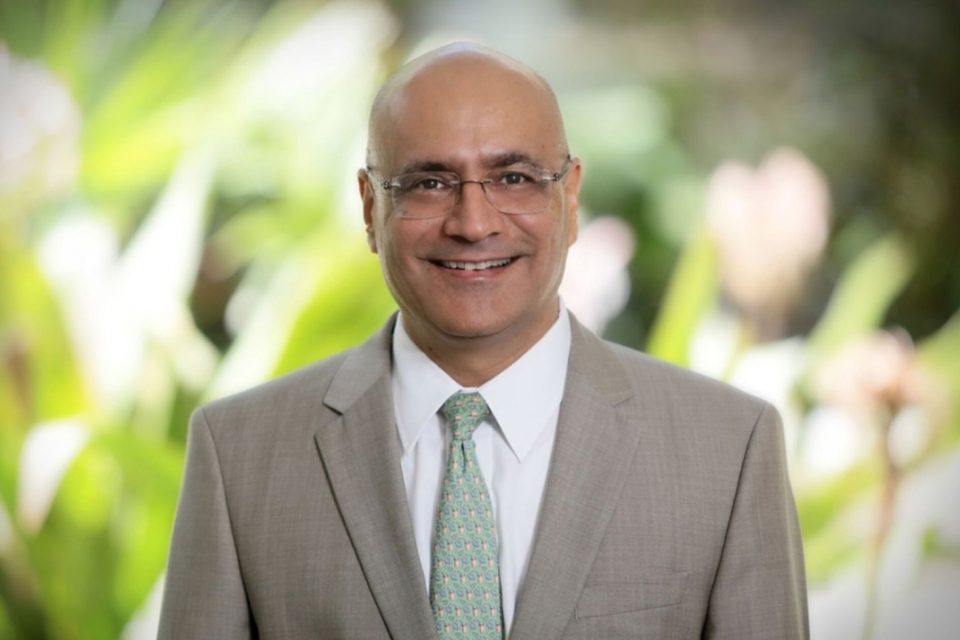
Anuj Mehrotra
Read more about Mehrotra and his plans for GWSB here.
Alumnus and Podcaster Oscar Zeballos Talks Leveraging Unfair Advantages on Bootstrapping — News at Smith
The Dingman Center for Entrepreneurship at the Robert H. Smith School of Business produces its own podcast, Bootstrapped. Hosted by Elana Fine, Executive Director of the Dingman Center, and Joe Bailey, associate research professor at UMD Smith, each episode features interviews with founders, investors, and serial entrepreneurs.
The newest episode of the podcast gets a little meta, as UMD alumnus Oscar Zeballos EMBA 16, co-founder of Podcast Village and executive producer of Bootstrapped, joins the show to discuss the business model behind his podcast company and the future of podcasting.
To listen to the podcast, subscribe to Dingman Bootstrapped on iTunes or download the episodes on the Dingman Center website.
Caught: Why Business Schools Might Lie to Improve Rankings
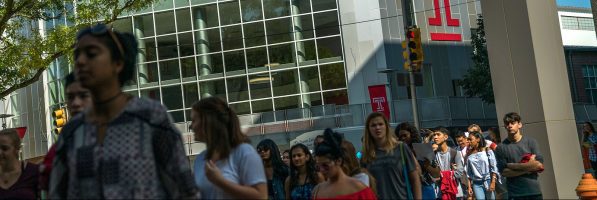
School rankings from sites like Forbes or U.S. News & World Report are often a crucial factor for students before they decide where they should pursue a degree. Using a combination of rankings, standardized test scores, job placement after graduation, and tuition costs, among other crucial factors, a school ranking a quick and succinct look at the relative merits and weaknesses of MBA programs throughout the country—and the world.
There is a lot riding on these rankings: not only do perspective MBAs often make decisions about where to pursue their degree based on these reviews, but graduates can use these rankings to demonstrate the quality of their degree to future employers. With such high stakes, organizations like U.S. News that compile these rankings rely on the accurate reporting of data from each business school.
So, what happens if the information is inaccurate, or worse? Data like student satisfaction and post-graduate salary—which can be so crucial in informing a prospective MBAs choice of school or program—is reported directly from the business schools, which often presents a conflict of interest potential. With so much at stake, would a school ever lie to increase their spot in the ranking?
Unfortunately, it seems the answer is yes. Just last week, the Online MBA program at Temple University’s Fox School of Business—a program that was consistently ranked in the top spot in U.S. News’ Online MBA ranking—vanished from the list. According to the initial announcement, new information had revealed that just 20 percent of Fox students in the Online MBA program had actually submitted test scores, a number that had initially been reported at a perfect 100 percent. Since the formula used by U.S. News weighs test score averages more if over 75 percent of students have submitted them, this inaccurate reporting from Temple Fox would have given the program an undeserved boost in the school ranking.
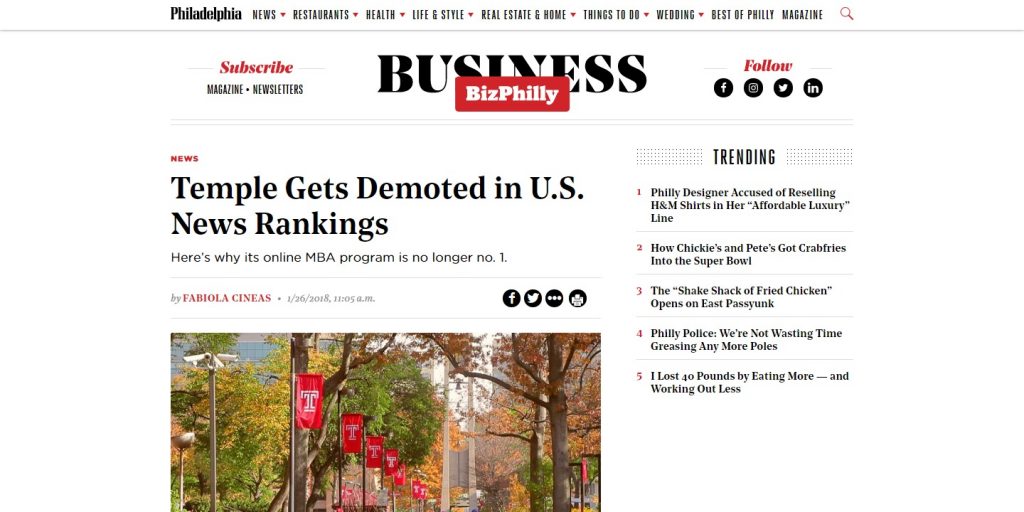
In the wake of Temple’s removal, questions continue to arise about the lengths schools go for good rankings/Photo via PhillyMag.
In the days since the initial announcement of Temple’s removal from the ranking, even more questions came out regarding the accuracy of Fox’s data. Further investigation found that Temple had reported 100 percent of students taking standardized admissions test for every year since 2014—a suspicious jump from the 25 and 33 percent that had been reported in the years prior. Since the test scores data submitted turned out to be inaccurate, it seems wholly possible that the data had also been misreported for the three years prior; the same years that Temple Fox held the top ranking for Online MBA programs.
This isn’t the first time it’s been discovered that business schools and even undergraduate programs have falsified or reported inaccurate data to boost its rankings. In 2013, Forbes was forced to remove four schools from its ranking of “America’s Best Colleges” due to inaccurate reporting: doctored SAT results from Bucknell University, false acceptance and graduation rates from Iona College, among others. In 2012, George Washington University lost its ranking on U.S. News’ “Best Colleges” list when it was discovered they were inflating the high school grades of their incoming students.
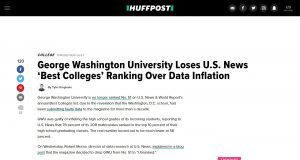
GWU was one of several schools in the past few years to submit false data for a rankings boost/via Huffington Post.
The problem may be even more far-reaching than some may suspect. In 2013, a survey of 576 college admissions officers found that 91 percent believed other colleges to be guilty of falsely reporting their admissions data. Even the school ranking creators themselves are shocked by this trend. In 2013, U.S. News editor Brian Kelly commented, “The integrity of data is important to everybody … I find it incredible to contemplate that institutions based on ethical behavior would be doing this.”
In 2005, the Association to Advance Collegiate School of Business (AACSB) took a deep look into this trend to examine why the issue of falsifying business school data might be so widespread. “Because rankings of full-time MBA programs are commonly presented under the label of ‘best b-schools,’ the public has developed a narrow definition about the breadth and value of business education,” the report states. Since most media rankings don’t consider factors like faculty research or doctoral education, MBA programs have become more likely to invest in more visible aspects of the program, such as facilities and marketing campaigns, which don’t actually deal with the quality of the degree. As a result, even high-quality programs may earn a lower media rank than they deserve based on the factors considered, adding pressure to do what it takes to earn a school ranking that matches what they perceive as the quality of the degree.
“Plenty of people apply to a school because it has reached the summit of a ‘best-of’ ranking, just as many people will see a movie or buy a book after it wins an award. That’s human nature,” Columbia Business School dean Glenn Hubbard told Fortune. “We want to experience the best.”
Whether or not placement in a school ranking truly represents the quality of a degree, it’s easy to see why the pressure is on for many admissions departments. A better school ranking can increase the number of applicants, providing for a more competitive, and diverse applicant pool, which creates a better quality admitted class. The cycle continues: success of these graduates can improve the possibility of future funding, providing more resources for the program and encouraging even more applicants to apply down the line.
“Rankings have become omnipresent in higher education, and they have enhanced the competition among institutions,” said Terry W. Hartle, senior vice president at the American Council on Education, in 2013. “And in any highly competitive environment, there is always a temptation to cut corners.”
For now, the Fox School of Business has been removed from the U.S. News Online MBA ranking. Concerns about false data continue to be evaluated, as organizations like AACSB continue to seek solutions and make recommendations for best practices when it comes to the collection and reporting of admissions data. In 2017, the AACSB publication “On Academic Rankings, Unacceptable Methods, and the Social Obligations of Business Schools,” suggested that schools and organizing bodies work together to find a method of data collection that includes “transparency, interpretability, and the empowerment of individual decision makers by whatever criteria truly suits their individual needs.”
For prospective students, its important to acknowledge this troubling but widespread trend as they make important decisions about where to earn a degree. While school ranking remains an easy way to compare programs against each other, students should consider not just the accuracy of the data but also the kind of factors reported in media rankings. While it seems possible that the number one program in a media ranking may not truly deserve that position, the real top program- the best for each individual’s needs and career goals—will always deserve first place.
BREAKING: U.S. News Removes Fox Temple From Online MBA Ranking

In some surprising news coming out of Philadelphia yesterday, the Temple University Fox School of Business Online MBA program—which had been named the best online offering in the country by U.S. News & World Report for the past four years—has been officially removed from the entire ranking due to misreporting admissions information.
According to Robert Morse and Eric Brooks, “the business school significantly overstated the number of new entrants for its 2016-2017 entering class who submitted GMAT scores. The misreported data resulted in the school’s numerical rank being higher than it otherwise would have been in the overall Best Online MBA Programs rankings and the Best Online MBA Programs for Veterans rankings.”
For the ranking, Fox Temple had originally reported that a remarkable 100 percent of applicants submitted GMAT scores for the survey. However, the school eventually informed the publication that only 50 out of 255 applicants actually submitted GMAT scores; less than 20 percent of the class.
Because of the infraction, the Fox School of Business will be completely removed from the 2018 ranking effective immediately. However, it will be eligible for re-entry on the 2019 ranking.
As of 4 p.m. EST, Fox Temple was still advertising its placement in the ranking on its main website.
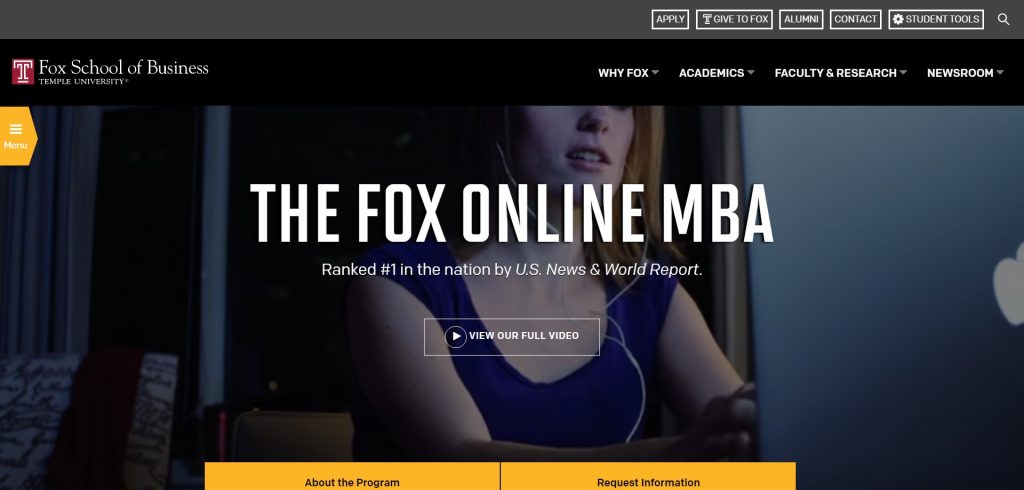
Earlier this afternoon, Temple released a statement regarding the change, which contained the following:
Once we discovered the error, we took the proactive approach to promptly self-report in order to correct a mistake. The data submitted overstated the number of incoming Fox Online MBA students who had provided GMAT and GRE scores as part of the enrollment process. It was our hope U.S. News & World Report would recalculate its rankings based upon the submission of revised data. However, we accept the U.S. News & World Report decision.
The Fox Online MBA program still embodies all of the qualities of the nation’s top program, regardless of the revised 2018 ranking. Our program has a long-standing reputation as one of the nation’s best online MBA programs.
We are doubling efforts to verify our data before it is submitted for rankings purposes, and we have every expectation that the Fox Online MBA program will return to its rightful place among the nation’s top programs of its kind in 2019 and beyond. Rankings are a byproduct of quality, and our focus will remain where it always has—on delivering high-quality programs and service to our students.
To ensure the integrity of the Fox School’s reported data and reporting, the University is hiring an outside, independent firm to review all of our school’s data reporting processes, including what happened in this instance, and to make appropriate recommendations. I have directed the entire Fox School to cooperate fully with this review.
Fox losing its spot at the top of the rankings is not unheard of. In 2012, George Washington University lost its spot in the U.S. News general university rankings. However, GWU, at the time, was ranked 51st overall. Temple, in this instance, is suffering a much greater penalty for submitting false information.
Stay tuned for more information on the story as it unfolds.
What Georgetown McDonough MBA Students Learn Outside the Classroom
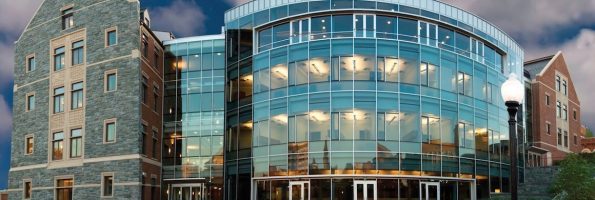
What do Colin Powell, an Indiana dairy farm, the DC Department of Public Works, and a triathalon have in common? They are all part of the fabric that comprises life outside of the classroom for MBA students at Georgetown University’s McDonough School of Business. Sure, it makes sense to judge a business school on what takes place inside the classroom. But in skimming three seemingly unrelated recent news briefs from the school, we realized that taken together they help paint a picture of what life outside the classroom can look like.
Former Secretary of State Colin Powell Speaks
In September, the former U.S. Secretary of State and Chairman of the Joint Chiefs of Staff Colin Powell visited Georgetown McDonough to speak on the subject of leadership. He discussed his former military and government experience, as well as a turning point in his career: earning his MBA. The event was part of the Stanton Distinguished Leaders Series and was hosted by the McDonough Military Association, an MBA student club for military veterans.
Faculty, staff, alumni, and students were all invited to observe the conversation, which began with Powell touching on his MBA education. He shared with attendees about how his MBA—which he earned from George Washington University in 1971—enabled him to focus “on the more human elements of leadership,” explained the McDonough press release. He also talked about how he improved his management and leadership skills by gaining a better understanding of basic human psychology.
Powell then went on to speak about his career. He shared his experience of being pulled in a variety of different directions, including public service positions, telling audience members: “You serve where you are needed. This is what service is all about.”
Then, he went on to highlight what he views as essential components of effective leadership, namely helping others, stressing the human element of an organization, and building trust. He explained that he never tried to be an authority but to influence others, stating “leadership and followership are completely enmeshed.”
Finally, he touched on the importance of diversity. “We are a vibrant economy because of immigration,” he said. “We shouldn’t demonize anyone.” He talked about how diversity is important for leadership and for building a stronger America. The event ended with questions from audience members and drew praise from many in attendance.
As Prashant Malaviya, an Associate Professor of Marketing at McDonough, said on Twitter: “Honor and privilege to welcome Colin Powel to Georgetown McDonough. Amazing talk! Thank you!”
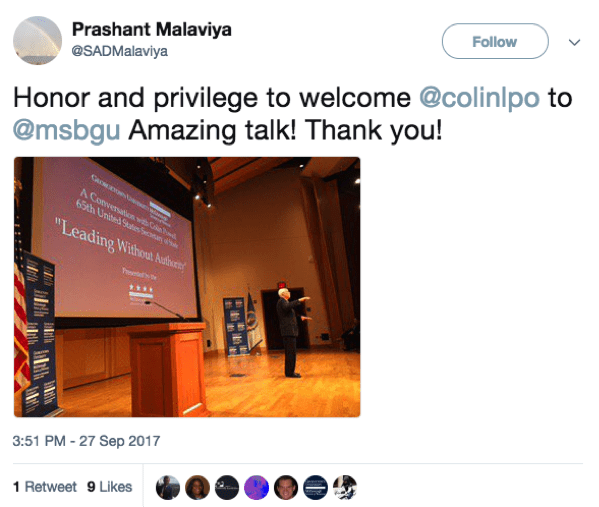
Hands-On Experience
Outside of learning from presentations and speakers, MBA students at McDonough also learn through hands-on opportunities such as a recent visit to Fair Oaks Farms, a sustainable dairy farm in Indiana, as well as a summer internship with the DC Department of Public Works (DPW).
The farm visit, which included 18 MBA students, was part of the course “Principled Leadership in Business and Society” taught by Associate Professor Ed Soule.
The trip was designed to help students learn more about sustainable business by seeing it in practice. Fair Oaks Farm is the sixth largest dairy cooperative in the nation and an agri-tourism destination owned by Sue and Mike McCloskey. While visiting, MBA students were able to see how the farm employed various practices and technologies to minimize its environmental footprint while maximizing the comfort level of the cows.
“It’s one thing to read a case about a sustainable business, but seeing it and meeting the people adds another dimension,” Soule said in a news release about the trip. “The other objective of the trip was for them to interface casually with the McCloskeys, to pose questions, and get a more nuanced understanding of the business.”
Second-year MBA student Emma Loughman called the farm an “epicenter of innovation” and said she enjoyed learning about the difference between organic and sustainable farming.
As for the internship with the DC DPW, two students—Paul LaCorte (MBA ’18) and Leo Dzidziguri (MBA ’18)—participated in the trial program between the department and Georgetown McDonough. Over the course of the hands-on, three-month experience, the students responded to a request by the city administrator to evaluate two critical areas: light vehicle repair turnaround and citywide compliance and preventative maintenance.
The internship required data collection, analysis, visualization, process mapping, site visits, and audits. “We were involved in projects that required knowledge from multiple fields,” Dzidziguri said in a news release. “For example, I performed statistical analysis on several years of data to identify reasons why the Fleet Management division could not meet its key performance indicators, while at the same time studying the operations and recommending a new map for more efficient processes.”
Extracurricular Fun and Fitness
Finally, no MBA program is complete without a bit of friendly competition. Early in September, three Georgetown MBA students participated in the 12th Annual Nation’s Triathlon. Hall Wang (MBA ’19), Taylor DeVoe (Evening MBA ’20), and James Hesburgh (MBA ’19) signed up for a 1,500-meter swim, 26.2-mile bike ride, and 10k run relay—respectively. This was an opportunity for the MBA students to meet outside the classroom and campus to explore their common interests.
In a short news brief on the school website, Wang described the triathlon as a relationship-building experience. “I like to think we showed what the Georgetown MBA experience is all about,” he said. “Regardless of cohort or program, we build relationships and partake in our community, one fun adventure at a time. Ours just started with a really early alarm clock and ended with some sore body parts, but now we have an exciting story to tell.”
This article has been edited and republished with permissions from Clear Admit.
SDSU Sports MBA Hits a Home Run with SportBusiness International

The Sports MBA at San Diego State University Fowler College of Business Administration was recently ranked as one of the best programs in the world—fourth overall to be exact. SDSU received its new ranking thanks to SportBusiness International, which is one of the leading classification systems for postgraduate sports management courses. Continue reading…
Two Georgetown McDonough MBAs Win Tech Case Competition
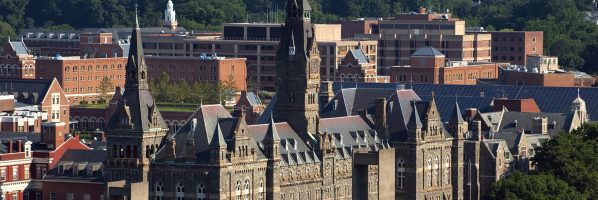
Two full-time MBA students from Georgetown’s McDonough School of Business recently won the top prize in the sixth annual MBA Technology Innovation Case Competition, taking home $6,250 in total prize money. Anne Laughlin (MBA’17) and Nicholas Lamp (MBA’17) competed against and defeated teams from John Hopkins University, University of Notre Dame and George Washington University. Continue reading…
